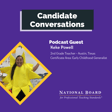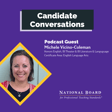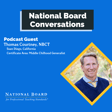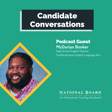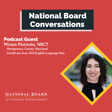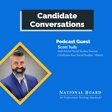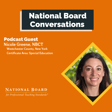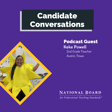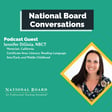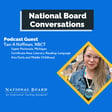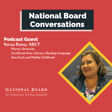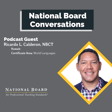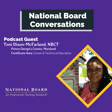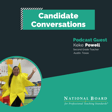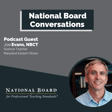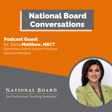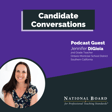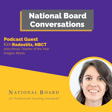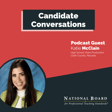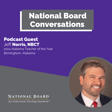Introduction to Tammy Kirkland and Certification Discussions
00:00:00
Speaker
Hey y'all, it's Eddie, and on this episode of National Board Conversations, I check in with Tammy Kirkland, the National Board Certified Teacher in Oxford, Mississippi. That was score release just happened and we dive deep into understanding scores.
Tammy's Certification Journey and Resources
00:00:11
Speaker
Tammy offers tips for understanding the feedback, talks about her emotional journey of not achieving her first time, and provides a few resources to help candidates along with the process. I won't keep you waiting much longer. Here's my conversation with Tammy Kirkland. Hey, Tammy, how's it going today? It's going great. How are you?
00:00:29
Speaker
I'm doing pretty well, you know, coming back off of a long holiday week, you know, getting ready to go into another holiday week here at Christmas. It's a crazy time this time of year. So, you know, we're here to talk about the national score release. It just happened. We're here to talk about the scores.
Role and Experiences at University of Mississippi
00:00:50
Speaker
Candidates haven't gone through there again, got their feedback, received their scores and saw whether they achieved it or not.
00:00:57
Speaker
But we'll get right into and get to know you a little bit. Can you tell us your current role, your job, and where you at? Sure. My name is Tammy Kirkland. I'm a middle childhood generalist, once renewed. And I'm a faculty member at the School of Education at the University of Mississippi. I teach math. And my primary job, though, is I run our candidate support program, the world class teaching program. We're one of five programs in the state of Mississippi. I deal anywhere
00:01:27
Speaker
with from two to 400 candidates a year in state. And we also have a national program that is new. So it's a busy time of the year for us as well. Yeah, it sounds like it. So you're a national board certified teacher yourself.
Overcoming Certification Disappointment
00:01:41
Speaker
Can you share a little bit about your journey as a candidate? My journey is probably why you're talking today, Eddie. Yes, my journey. I missed certification by less than one point.
00:01:55
Speaker
I'm going to pause for dramatic effect. Okay. I remember the day I pulled up my scores I was just, I don't even know how to describe it I, I, you know, I would say I was surprised but part of me wasn't because I had, I'm a writer, and I had
00:02:15
Speaker
edited all of my questions and rewritten them so much so till the night before I submitted, I went back to make sure I answered all the questions. Great idea, but I suggest you do it not the day before, I did a little bit earlier. And I couldn't even find the questions. I had edited the questions so much. I had totally changed the questions. So I had totally rewritten an entry. Back then it was an entry.
00:02:42
Speaker
in my bedroom floor at 230 in the morning. So I kind of kept that secret close to my heart the entire time I was waiting for scores, but I didn't, I didn't certify. I missed it by one point. And you know, it, it, it not going to lie. It
Certification as a Journey of Growth
00:02:57
Speaker
hurt. I work with advanced candidates a lot. Kind of think that may be one reason the Dean hired me because I can speak to candidates who certified as well as those who did not.
00:03:08
Speaker
And I think the very first thing you have to do is you have to give yourself time to absorb it because I was shocked. I was hurt. I was mad. I was real mad. I remember when I I'm the old school, when the box came in the second time, I mean, it across the house and my husband was just speechless. He's like, what are you doing? And I'm so I picked my box up and I went outside and proceeded to kick it across the yard until I felt
00:03:37
Speaker
better and ready to start again. But I will tell you the day that I received my scores, I did make the decision that day to finish it because National Board Certification is a journey. I would encourage teachers to remember that. You know, I've seen a lot of strong teachers not certified, but you have to remember the National Board process is going to make you evolve as a teacher.
Strategies for Feedback and Improvement
00:04:04
Speaker
You cannot just use the same teaching modality.
00:04:07
Speaker
it really focuses on you collecting and using knowledge of students to make instructional decisions. And you know, I think as teachers, especially teachers that's been teaching a while, you sort of get locked in to a certain way of teaching and the national board is going to make you grow. And you know, that's sort of what happened to me. So I did, you know, I went back certified in all areas. So, you know, I'm always willing and ready to help
00:04:36
Speaker
teachers who did not certify. We appreciate it. It's not about getting knocked down. It's about making sure you get back up. You wrote a blog for us discussing your journey that we'll link to in the show notes as well. And I can imagine, like you talked about, it was super emotional. Yeah, that blog, I was the National Award Fellow back, I think, 2019.
00:04:59
Speaker
And they called me and they said, we want you to blog. And I'm like, yes, I'm going to publish something. And I'm just doing my happy dance all over the place. And then they're like, we want you to write about not certifying. And I'm like, you want me to write about my personal failure? And they're like, no, no, no, no. You can't say it that way. But you know, that's the way it feels to teachers sometimes. So I think you have to validate it. It doesn't mean you're a failure. You just didn't exactly
00:05:27
Speaker
get it in the lines that the national board needs it to be in. But yes, I did. In that blog, I'm glad you're going to link to that because it is very heartfelt. Yeah, and whether we like to believe it or not, this is a really high stakes for teachers like you and others. So this can get really emotional. So what coping strategies would you suggest for teachers who didn't achieve on the first track? Well, I think the very first, you've got to give yourself time to deal with it.
00:05:57
Speaker
But the most important thing would be, you nailed it a while ago. Pick yourself back up, okay? You've got to pick yourself back up. You got to give yourself time to realize what happened. And then you've got to start over. And to me, that's a point that a lot of teachers get confused on because you get feedback statements. And if you've been on social media, you've heard teachers say, they can't make sense out of the feedback statements. They don't know how to use the feedback statements. They don't know what they did wrong.
00:06:27
Speaker
Well, I work with teachers. I've got an advanced candidate workbook that I think you're also going to make available for them. Yeah, that will walk them through how to decipher those feedback statements. Because those feedback statements are all connected. Well, let me back up. Most of them are connected to one of the five core propositions. There are about nine feedback statements you can get that are more technical.
00:06:53
Speaker
Issues like the very first one I look for when i'm helping a candidate is did not follow instructions. And i've seen that a lot if a teacher sees that that you know that's kind of been in a way, a good thing because, hopefully, you can go back and easily figure out what you didn't do usually. it's a submitting issue that you did not follow the guidelines on submitting you know your evidence or your writing or something of that, which is an easy fix, you know.
Importance of Standards in Teaching
00:07:21
Speaker
So yes, a lot of different things to look at moving forward. But again, I like in that work advanced candidate workbook will take him through that because the important thing is before you begin again, you need to realize
00:07:37
Speaker
what mistakes you made. So many teachers will just choose a different topic, like let's say they do their first topic on apples. Well, then they come back again and all they do is they change the oranges, but they use the exact same procedures and that gets them in trouble. So after you've decided to finish this journey, which it is a journey, the second thing you need to do is learn how to analyze those feedback statements because it is very doable and you'll see, is it okay if I go ahead and talk about this now?
00:08:07
Speaker
If you'll see, I've got, and we're doing a presentation on this in a couple of weeks as well, that'll be available. I think you said you're gonna link to it too. But in the workbook, what you do is you take those feedback statements and you open up the component that you got the score on and you find the rubric that aligns with your score. Like if you scored a,
00:08:34
Speaker
2.25, you would open up the 2.0 rubric. And then you begin looking for the common language. And that's one thing I really like about this process. It uses common language across the boards. So you will find common language, those feedback statements, often embedded in your rubrics. And sometimes the rubrics yourself will tell you, like let's say, I think one of the examples I use in the advanced candidate
00:09:04
Speaker
Let's see, let me open this up really quick, because it's got a sample that I included in there on how to do this. It talks about, give me one second, Eddie. It talks about how to, okay, here we go. It talks about identifying it. For an example, you know, it may say that it may
00:09:29
Speaker
Mention your goals, you may have a feedback statement that mentions your goals will you open up that rubric and you look for one of the bullets that has the word goals in it. And so that's identifying something and those rubric bullets are more than just what you're graded by it will tell you that if you open up the number two rubric it often says the girls goals are vague or not linked.
00:09:53
Speaker
You know, to your assessment or the work that the students do so right then, if you find if you make that connection. Then you've discovered oh my goodness my goals were vague or you know something like that, and then I take it one step further I like using the statement standards and I will say.
00:10:13
Speaker
You really gotta pay attention to those standards. If you don't know your standards, you're not going to certify, okay? Yeah, and if you wanna go back, you can listen to our episode with Jamie Father White, where she dives into how important the standards are. It's, I call it the Bible of nationalism. You have to be able to integrate those standards in your classroom.
Integrating Feedback and Standards into Practice
00:10:32
Speaker
So after we identify the bullet, then we identify the standard that that bullet fits under.
00:10:39
Speaker
And the thing about the standard is they are examples of accomplished teaching. You know, I remember that first year when I didn't certify, so I go back, you know, got my head stuck between my legs and go back, I open up my standards. And I remember reading through them and thinking, wow, that's a great idea. So clearly I must have just perused my standards the first go around. But another mistake that the teachers make is they will use the language of the standards, which that in itself
00:11:09
Speaker
is not a mistake, but when that's all they do. That doesn't get it, you can use the language of standards, but you have to show what that standard looks like in action in your classroom that's evidence and you know another thing that teachers do they make it too big. Because national boards really is just looking at a.
00:11:32
Speaker
glimpse into your classroom so often I work with teachers who've got like seven goals that's not reasonable. If you have seven goals, I can tell you right now your writing is going to be descriptive and not analytical. So I tell my teachers keep it between two and three manageable goals that you can really dig into and get analytical in your teaching and your writing.
00:11:57
Speaker
You touched on it just a second ago evidence that's a big word that comes around the buzzword that comes around. Can you share what it means when candidates see the word evidence on this. Always tell mine that evidence means standards standards in action in your classroom and I tell my.
00:12:14
Speaker
To print out those standards, I know we live in a technical world, you should also have an electric copy because they're a PDF and you can actually search a PDF for any buzzwords you want. But I love for the candidates to have a hard copy of that and to read through it and highlight what they do not do. I find that when teachers focus on what they don't do, as opposed to what they do do, it really has a stronger impact on their teaching.
00:12:43
Speaker
If you just read through it and you're like, yeah, I do that. I do that. I do that, you know, then you don't work to do it better. So you want to look at things that you don't do. And again, you want to use knowledge of students. I want to point our candidates to some fabulous resources. The
00:13:01
Speaker
General portfolio instructions, I think like on page 17 through 33 has, it's not really an exemplar per se, but it is still a fabulous resource and it doesn't matter if it's not your certificate area, but it is an example of National Board teaching and how, you know, writing up a component should look. And if you read through that, what you will notice is how much the teachers use knowledge of students
00:13:30
Speaker
to make instructional decisions. And another thing, I think teachers, and I'm an administrator, so I understand accountability. I believe in accountability. I believe in assessment. Maybe not a popular thing to say, but I do. But I know a lot of the teachers have been so conditioned for their state accountability that it's hard to break away from that and realize in national boards, yeah, we're looking for a certain score for you to get, but in regards
00:13:59
Speaker
of working with your students national boards could even be a remediation you don't have to have the highest achieving classroom. The secret is using the knowledge of the students to make your decisions and then you go back and you incorporate those standards.
00:14:16
Speaker
What I like to do is I teach my, and I've tried many, many things over the years, Eddie, and this has been the best received. I teach them to make a standard notebook. I have them to go buy one of those dollar composition notebooks at Walmart, that the pages are sewed in. The reason I like those is we're going to be flipping those pages a lot. So that way you can't wear it out.
00:14:43
Speaker
And I tell them to read their standards. I like to say a standard a day keeps the retakes away. It's a big document. I mean, it's like 90 to a hundred pages. Okay. And the world we live in with families and other commitments, you're not going to go home and just dive into it and do this in the night. But one standard a day is a very realistic goal. So you take that notebook and you outline that standard.
00:15:09
Speaker
In that notebook and what that does that hits a learning style for you familiarizes you with your standards and then when you get back to do those components again you got it in front of you. One more thing you plan with those standards in front of you, you can't teach your lesson and then go back to write up your component and integrate the standards it's too late.
00:15:31
Speaker
So when you're planning those lessons, you have to have your standards in front of you and you know, fortunately, the components don't require you to integrate all the standards, I think, is on page one and two of each component, it tells you which standards to look at so a lot of good stuff a lot of things i'm a real big.
00:15:52
Speaker
strategic test taker. I guess maybe you're picking up on that. And it pays for teachers to be that way when they're doing national boards as well. Lots of planning. The more you do on the front end, the more you get out on the back end. So that sounds like a smart tip, a smart tip and strategy for educators dealing with their feedback statements. Well, do you have any others for what they're dealing with directly when they're dealing with their statements directly?
00:16:15
Speaker
Well, you know you again you got to figure out what you did wrong and the workbook will help you with that, as well as the training that's coming.
00:16:25
Speaker
figure out what you did wrong and what you need to do differently. And let me point out there are some things you can use again and some things you cannot, you will find that in the guide, the general portfolio instructions. You need to use this year's kids. Sometimes I see people who want to recycle it and just edit
Using Atlas and Refreshing for Certification
00:16:45
Speaker
it. That's a no-go for multiple reasons.
00:16:48
Speaker
But, you know, just planning, again, knowing those standards, understanding how to successfully integrate a standard, showing a standard in action in your classroom. Oh, you know what? I almost forgot. They do have exemplars. I was talking about the general portfolio instruction, but there is an atlas for candidates. And I have seen that you guys also have done presentations on that. So maybe you can find that one and link it as well.
00:17:16
Speaker
That's for sure. Yeah, candidates can get a free Atlas class subscription. You get four cases. It does not, and this is the biggest thing I hear. Well, Ms. Kirkland, that's not my certificate area.
00:17:29
Speaker
That's not why the national board made that available for you. The Atlas includes videos that certified listen at this at a 3.75 or higher, the work samples, and most importantly, even more important than the video is the commentary. Eddie, they got four commentaries that they can dive in and read. And the big takeaway from that, again, is for the teachers to realize how analytical, how
00:17:57
Speaker
Student centered that writing. Yes. So that is a very, very good tool that they should also have, you know, They just need to take a little bit of time, you know, get their head right. Enjoy the holidays. Okay. Enjoy the holidays. Just make the decision before the holidays. I'm going to do this. I'm going to pick it back up in January and then forget about it. Enjoy Christmas. Okay. No, we got Christmas coming up. No need to come back in January renewed.
00:18:27
Speaker
ready to tackle this, ready to analyze what you didn't do that you need to do, what you need to improve on and get a plan and go from there.
Tammy's Teaching Passion and Personal Interests
00:18:39
Speaker
There we go. Perfect. All right. So we're going to get to know you a little bit outside the classroom in a little bit away. So we're going to first question is how did you actually stumble into the world of education? How did you become a teacher? Um, well, I enjoyed it when, when I was, I remember being in the first grade,
00:18:56
Speaker
Wanting to be a teacher. Isn't that crazy? Yeah, I did. But I mean, I took a couple of detours as well. But my kids, I actually have a degree in computer eddy design and drafting technology. We don't have time for that story. So my second career was education. And when my son was small,
00:19:21
Speaker
I was a kindergarten assistant one year I knew two things I wanted to teach and it was not kindergarten kindergarten teacher so.
00:19:32
Speaker
I remember then that planted the seed. I wanted to get into education. I went from being an assistant teacher to a mother's, no, I went mother's morning out to then assistant teacher. And I remember my husband got a big raise one day and he come home and he was so excited about his raise. And I'm saying, great, now can I go back to school? Oh, I did. I went back to school full time with two little kids. Gosh,
00:19:59
Speaker
It was crazy. I would take 18 and 21 hours a semester. I didn't even do that in undergrad. It was tough, but that's why it got me an education. And you know, I love the autonomy that we have as teachers. You know, I've always considered myself an entertainer if you think about it, because you got like 25 kids in front of you and you've got to be an engaging teacher.
00:20:24
Speaker
Yeah, those were always my most fun teachers were the one that engaged with us and got to know us. Music, movement, you know, when you look out there and they're like asleep, if I stand up, brain break time, you know. I just love it, just absolutely loved it. That's awesome. All right, so another question. If you had to delete all but three apps from your phone, you keep messaging, camera, and calling people, which would you keep?
00:20:52
Speaker
I would keep my Google maps. That would make my very, very first one. Cause I couldn't, I have. It's become essential in like today's direction. I mean, it's horrible. So, uh, I would keep that. I would keep. What about my music? Is that, can I keep that or is that like Spotify? Yeah. Okay. Well, I keep music, you know, and then you said I could keep messaging. So I guess you said I could keep my camera.
00:21:22
Speaker
I don't really use, I really don't use it that much. Maybe Instagram, maybe. I like Instagram because I don't have to respond to people. I can just look at things. And double tap and like a picture and move on. Really, really, really. And do you have two or three books you'd recommend of any drama throughout? Yes, the book Educated. I think we talked about that before. That is a
00:21:48
Speaker
true book, but it reads like fiction. My goodness, if you've not read that, you need to read that. It's unbelievable. And then I kind of like, I go through different things. You know, I'm myself, I'm an issue writer. So sometimes I'm in women's genre. Sometimes I'm in mystery. As far as historical fiction goes, Four Winds by Hannah, Christian Hannah.
00:22:10
Speaker
is a fabulous book. It's about the dust storm. And you know, I had not really, wasn't really familiar with that. So those are some of the books I, right now I'm listening to a book about the Royal family. I mean, I'm, I'm a big audible person. I drive a minimum of a hundred miles a day. Always listening to books, plural. So a debate that's been coming up recently is, is audio book, should our audio books considered reading? Well, where do you fall?
00:22:39
Speaker
Of course they are. Absolutely. I mean, anybody that says that clearly is not a real audible member or you would understand it definitely is. So yeah, definitely. I like it. Get your word on this debate. Bad narrator can ruin a book.
00:23:03
Speaker
And it tickles me when I hear people do those Southern draws. We don't talk like that anymore. Right. Having somebody that's lived in Houston, I realize these accents are very different, no matter where you go across the South. I love
Final Encouragement and Upcoming Resources
00:23:19
Speaker
audibles. Yeah, sure do. All right. Well, thank you, Tim. This was a lot of fun. I really enjoyed this conversation. Yes. And I will also, on my own, be doing some trainings
00:23:32
Speaker
this spring as well for candidates that didn't certify, and I'll share those links. I have a professional board's Facebook website, because like I said, we do have a national program, so I work with Mississippi teachers and teachers everywhere. I just want to help teachers. Let me leave them with this thought, okay? If you're watching this, chances are you didn't certify, all right? I just want to leave them with this message. Don't quit.
00:24:00
Speaker
Consider this a journey. We are here. We will help you pick yourself up and start again.
Episode Wrap-up and Farewell
00:24:07
Speaker
Thank you. Thank you for the Congress and we will leave it there and appreciate you taking the time to talk to me. Absolutely.
00:24:14
Speaker
That was amazing. I love the energy Tammy brought to this episode and I'm looking forward to having her back in the future. If you're a candidate, listen to this episode. Remember her words. Don't quit. It's a journey. Be sure to check out all the resources we talked about down in the show notes. They'll be linked down there. And I just want to say thanks again to Tammy for taking the time to chat with me and say thank you to listen to this episode of National Board Conversations. This is Eddie Santiago signing off. I'll see you next time.

